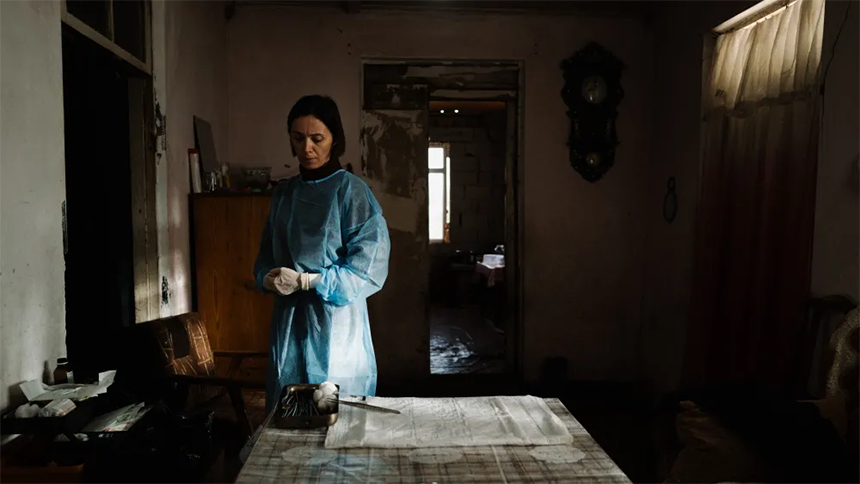New York 2024 Review: APRIL, A Strange Manifestation
Dea Kulumbegashvili's second feature is a challenging, feminist work, to say the least.

After her impressive debut film, Beginning (2020), about a woman's plight in a deeply religious and patriarchal society, Georgian director Dea Kulumbegashivili returns with April.
And it's a challenging feminist work, to say the least. The film features some difficult to stomach scenes of real-time medical procedures.
April starts in the complete darkness, then there is a hideous naked creature, traversing a shallow pool of water in the dark. Her skin's all saggy and her feature is shapeless. The sound of children playing in the water accompanies this disturbing sight. Throughout the film, we see the creature over and over again.
We are then introduced to Nina (Beginning's Ia Sukhitashvili, starring in another challenging main role), an OB/GYN delivering the baby in an operating room. It's a real-time birth filmed. After the graphic birth, the baby is not moving.
Later, the father of the still-born baby blames Nina for its death. There's a rumor going around that Nina performs illegal abortions in this rural, agricultural region of Georgia.
Nina rebuffs the insinuations and points out to the ignorant, superstitious local population that the couple had no prior consultations or pre-natal care at the hospital until it was too late to find out that there were complications with the young mother's pregnancy. It turns out, though, that Nina does perform outpatient abortions for unwanted pregnancies (young mothers, rape victims, and so forth, usually on the patient's kitchen table).
Her colleague David warns her about her extracurricular activity, that the hospital admins are itching to get rid of her with any excuses: "That's the side-job for the under-paid nurses, you don't need to do it. You are not changing the world."
In her spare time, Nina visits bars and cattle auctions at night, looking for anonymous sexual encounters that result in violence. It is as if she is actively challenging what she can get away with as an educated, professional woman, in a male-dominanted, deeply religious and superstitious society, even if it means bodily harm or even losing her career.
There is a prolonged scene where we are presented with a young deaf-mute girl's exposed midriff on the dining room table as Nina performs an abortion. Her older sister summoned her, knowing she does the procedure.
It is revealed that they don't know the who the father is. Yet they refuse to take pills -- the older sister has five children, all delivered by Nina -- because of religious reasons, and they can't let the man of the house know about the pregnancy. The scene is not graphic, per se; it's procedural and detached. But It goes on forever.
April is one of the few films that deals with the same subject matter that does not resort to making the actual procedure as a selling point or the emotional crux of the film. It comes later, involving the same girl.
Kulumbegashivili's formalist approach in April -- full frame, long continuous shots, minimal coverage and mostly from its protagonist's POV -- is effective in creating the dread and isolation that Nina feels in an oppressive society where she sees no reprieve for women. The director delves into metaphysics, as she did with Beginning, and one can interpret the creature as a modern-day witch, a medieval monster who kills babies and is reviled and persecuted by the male-dominant society, still steeped in superstitions.
Dustin Chang is a freelance writer. His musings and opinions on everything cinema and beyond can be found at www.dustinchang.com.







